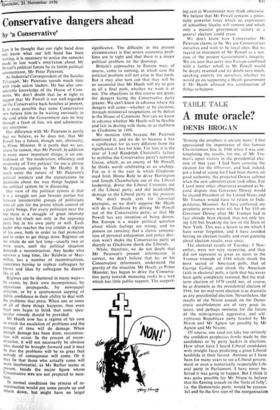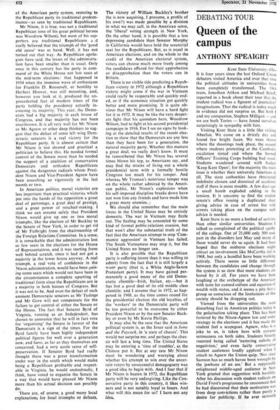TABLE TALK
A mute oracle?
DENIS BROGAN
'Stoning the prophets is ancient news.' I first appreciated the importance of this famous Chestertonian line in 1948 when 1 was con- templating the results, for me, of Mr Tru- man's upset victory in the presidential elec- tion of that year. I had been covering the election for the Observer, and had, indeed, got a kind of scoop for I had been shown, on good authority, the projected Dewey cabinet when the new administration took office. For 1 (and most other observers) assumed as be- yond dispute that Governor Dewey would be elected President of the United States and Mr Truman would have to return to Inde- pendence, Missouri. As I have confessed, my prophetic powers were nil, for I bet $10 on Governor Dewey after Mr Truman had in fact already been elected, thus not only los- ing $10 but breaking the law of the State of New York. This was a lesson to me which I have never forgotten, and I have avoided betting on election results, and even guessing about election results, ever since.
The electoral results of Tuesday, 3 Nov- ember, were not very surprising, and they did not represent so great an upset as the Truman triumph of 1948 which shook the most sacred of American polls, that of George Gallup, and shook the American faith in electoral polls, a faith that has never been quite completely restored. But the mid- term election of 1970 could not, of course, be as dramatic as the presidential election of 1948, for no mid-term election is as dramatic as any presidential election. Nevertheless, the results of the Nixon assault on the Demo- cratic establishment are of very great in- terest, and perhaps ominous for the future of the reinvigorated, aggressive, and self- righteous Republican party headed by Mr Nixon and Mr Agnew (or possibly by Mr Agnew and Mr Nixon).
Oi course, one need not take too seriously the confident prophecies firmly made by the candidates or by party leaders in elections. How often have I heard Liberal candidates with straight faces predicting a great Liberal landslide in their favour. Anxious as I have been for many years to see a Liberal govern- ment or even a numerically respectable Lib- eral party in Parliament, I have never be- leived it was going to happen. But I think it was quite possible for Mr Nixon to believe that his flaming assault on the 'forts of folly', i.e. the Democratic party, would be success., ful and be the first sign of the reorganisation
of the American party system, restoring to the Republican party its traditional predom- inance—as seen by traditional Republicans.
Mr Nixon, it is true, was not a traditional Republican (one of his great political heroes was Woodrow Wilson), but most of his sup- porters are traditional Republicans a .d really believed that the triumph of the 'good old cause' was at hand. Well, it has not turned out that way. As Republican apolo- gists have said, the losses of the administra- tion have been smaller than is usual. Only once in this century has the party in com- mand of the White House not lost seats at the mid-term elections: that happened in 1934 when the immense wave of enthusiasm for Franklin D. Roosevelt, or hostility to Herbert Hoover, was still mounting, and, however you look at it, produced the un- precedented feat of modern times of the party holding the presidency actually in- creasing its majority. This year, the Demo- crats had a big majority in each house of Congress, and that majority has not been overthrown. It is all very well for Mr Nixon or Mr Agnew or other deep thinkers to sug- gest that the defeat of some left wing Dem- ocratic senators is a real victory for the Republican party. It is almost certain that Mr Nixon is too shrewd and practical a politician to believe this. He needed formal control of the Senate more than he needed the support of a coalition of conservative Democrats - and orthodox Republicans against the dangerous radicals whom Presi- dent Nixon and Vice-President Agnew have been assaulting so vigorously in the last month or two.
In American politics, moral victories are less important than practical victories which put into the hands of the opposition a great deal of patronage, a great deal of prestige, and a great power of mischief-making. I think we can assume safely that President Nixon would give up one or two moral triumphs, like the election of Mr Buckley to the Senate of New York, in order to get rid of Mr Fulbright from the chairmanship of the Foreign Relations Committee. In a sense, it is remarkable that the administration lost so few seats in the elections for the House of Representatives, and it was starting from well behind scratch, since it had not got a
majority ip the lower house anyway. A real triumph, a real vote of confidence in the Nixon administration, would have been gain- ing some seats which would not have been in
the circumstances a complete upsetting of traditional form since the Republicans are in a majority in both houses of Congress. But it was not to be. And even the defeat of such eminent Democratic senators as Mr Tydings and Mr Gore will not compensate for the failure to get control of either the Senate or the House. The fact that Senator Byrd of Virginia, running as an Independent, has chosen to announce that he will in fact vote for 'organising' the Senate in favour of the Democrats is a sign of the times. For the Byrd family have been highly independent political figures for well over a generation now, and have, as far as they themselves are concerned, had a very acute sense of self- preservation. If Senator Byrd had really thought there was a great transformation under way in the south which would make being a Republican profitable and respect- able in Virginia, he would undoubtedly, I think, have voted to organise the Senate in a way that would have pleased Mr Nixon more than his actual decision can possibly do.
There are, of course, a good many local explanations for local triumphs or defeats, The victory of William Buckley's brother (he is now acquiring, I presume, a profile of his own?) was made possible by a division in what we may call, in the American sense, the 'liberal' voting strength in New York. On the other hand, it is possible that a less depressing candidate than Senator Murphy in California would have held the senatorial seat for the Republicans. But, as is usual in American elections, and on the whole to the credit of the American electoral system, voters can choose much more freely among the candidates offered for their approbation or disapprobation than the voters can in Britain.
There is no visible tide predicting a Repub- lican victory in 1972 although a Republican victory might come if the war in Vietnam could really be respectably and quickly -end- ed, or if the economic situation got quickly better and more promising. It is quite ob- vious that Mr Nixon will have a hard fight for it in 1972. It may be like the very desper- ate fight that his quondam hero, Woodrow Wilson, had to fight at his second presidential campaign in 1916. For I see no signs by look- ing at the .cletailed results of the recent elec- tion to show that the Democrats are any less than they have been for a generation, the natural majority party. Whether this matters a great deal, we really don't know. It must be remembered that Mr Nixon has several times blown his top, as Americans say, and may find the strains of living out a whole presidential term with a formally hostile Congress too much for his temper. And whereas Mr Truman's notorious temper was on the whole rather admired by the Ameri- can public, Mr Nixon's explosions when his self-imposed discipline breaks down have not won him any friends and have made him a great many enemies..
We should also remember that the main issues in the United States may be entirely domestic. The war in Vietnam may fizzle out. The fizzling may be concealed by some kind of formal public-relations evasion, but that won't alter the substantial truth of the fact that the American attempt to stop 'Com- munist aggression' in Vietnam has failed. The South Vietnamese may stop it, but the United States no longer can.
It is also possible that the Republican party is suffering (more than it was willing to
admit) from the fact that it is still largely a WASP party (that is, a White Anglo-Saxon
Protestant party). It may have gained per- manently a good many of the old Demo- cratic clientele—Irish, Italian, etc.—but it has lost a good deal of its old middle class clientele; and I assume that in 1972, as hap- pened in 1968, as the time comes round for the presidential election the old loyalties of the `workers' to the Democratic party will be too powerful to be overcome by either President Nixon or by the new Senator Buck- ley or even by Mr Kevin Phillips.
It may also be the case that the American political system is, as the Joxer said in Juno and the Paycock, in 'a state of chassis'. This
would not surprise me, and perhaps the chas- sis will last a long time. The United States may be entering a `time of troubles', as the Chinese put it. But at any rate Mr Nixon must be wondering and worrying about whether his attempt to win over the uncer- tain voters by unsuccessful demagoguery was a good idea to begin with. And I fear that if
Mr Nixon is beaten in 1972, the Republican
party will be very unforgiving. Like the Con- servative party in this country, it likes win- ners and is not notably loyal to losers. And what will this mean for us? I have not any idea.















































 Previous page
Previous page